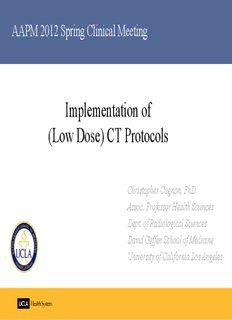
Implementation of (Low Dose) CT Protocols - AMOS Online PDF
Preview Implementation of (Low Dose) CT Protocols - AMOS Online
AAPM 2012 Spring Clinical Meeting Implementation of (Low Dose) CT Protocols Christopher Cagnon, PhD Assoc. Professor Health Sciences Dept. of Radiological Sciences David Geffen School of Medicine University of California Los Angeles The Impetus… • In U.S., CT comprises only 11% of all exams but generates 67% of total diagnostic dose • Mettler 2000 • Annual number of CT exams in US has grown from 3 million in 1980 to estimated 62 million in mid 2000s • Brenner/Hall 2007 • Number of pediatric ED visits that included a CT increased five-fold from 1995 to 2008 • Larson 2011 Cagnon, CT Protocols, AAPM 2012 2 Radiation exposure to US population (then …) • U.S. average: about 360 mrem (3.6mSv) /year, the majority of which - 300 mrem (3 mSv) - from background • 15% or about 55 mrem (0.55 mSv) from medical Essential Physics of Med. Imaging, Bushberg, et al., adapted from NCRP 93, 1987 Cagnon, CT Protocols, AAPM 2012 3 Population Radiation Exposure (now) NCRP - 2008 6.2 mSv (620 mrem) ED per US citizen Background still around 300 mrem (3 mSv)… But now 300 mrem (3mSv) from medical (~50% of total) and half of that from CT alone. Cagnon, CT Protocols, AAPM 2012 4 Increased Utilization: Technology, Speed, Reimbursement • Sub-second, helical rotation, multi-slice technology increases throughput. • Improved diagnostic capabilities & higher billing rates. • Significant increase in pediatric applications brings additional concerns ↑ radio-sensitivity • ↑ organ and effective doses, particularly when technical factors • are not adjusted Cagnon, CT Protocols, AAPM 2012 5 Background: CT/Radiation News • Literature & media: “high CT utilization increases cancer risk…” Dose from CT same as AB survivor 1-2 miles from ground zero – –In 2007 70 million CT scans → 29,000 cancers (Berrington, Arch Int Med 2009) 600,000 annual CT scans on children under 15 → 500 cancer – deaths (Brenner AJR) Children more sensitive → Image Gently program • • Up to 2% of all cancers in US in the future might be associated with radiation from diagnostic imaging (Brenner 2010) Cagnon, CT Protocols, AAPM 2012 6 How did this become an issue? • Regardless of what stochastic risks may exist (cancer risks) it was the deterministic effects that got everyone’s attention … Stochastic: probabilistic chance of occurrence that increases • with dose, severity independent of dose (lottery) Deterministic: requires dose threshold, severity of effect • increases with dose Cagnon, CT Protocols, AAPM 2012 7 CT incidents & reaction • Brain-perfusion studies in California and Alabama (2009-2010) Hundreds of patients “overdosed” up to 10x • “normal” dose → hair loss, skin burns, cataractogenesis? • Mad River Incident: repeated scans in single location on baby • Class action lawsuits against multiple hospitals and vendors • Media attention & requests for CT experts/ opinions Cagnon, CT Protocols, AAPM 2012 8 Professional Response ACR, ASNR, AAPM: • Over reliance on automation • Review/ consider dose reference levels • Importance of accreditation • Protocol review by lead radiologist, technologist, physicist • Enable dose reporting functions • CT specific training for all parties involved • Position statements in response to media stories on increase in medical radiation utilization, cancer risk, overdoses and accidents Cagnon, CT Protocols, AAPM 2012 9 Government Response • Recommendations to Health Care Providers: Investigate for potential injuries • Review protocols & implement QC procedures • Adjust for appropriate dose & be familiar with dose • indices • Recommendations to Public: Consult with your physician • Track your dose (now an i-phone app.) • Cagnon, CT Protocols, AAPM 2012 10
Description: